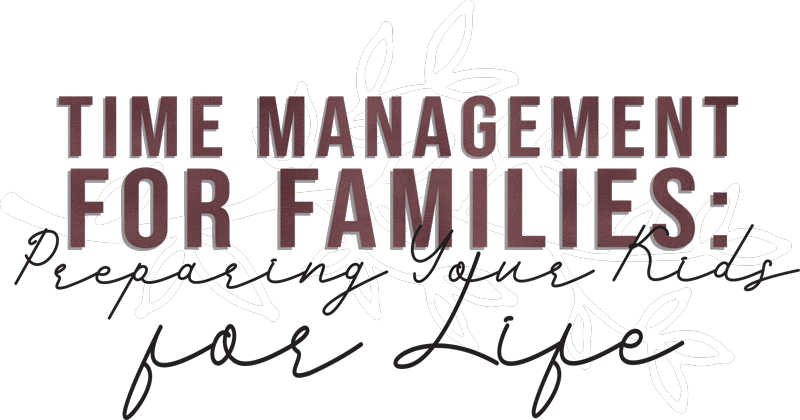

by Connie Albers

The alarm goes off and your teen hits the snooze button three times before making any attempt to get out of bed. Another child isn’t dressed because she can’t decide what to wear. Meanwhile, you are frantically trying to make breakfast and get out the door so you aren’t late for an appointment. You get down the road, though, and realize you forgot to grab the paperwork you need to take with you. At this point, everyone feels stressed and irritated.
Have you been there?
Every time this happens you tell yourself you don’t want your family functioning this way, but you can’t seem to change things. You aren’t alone! Learning to be good at time management is challenging. For our family, it took many failed attempts before finding what worked for us, and not against us.
One of the questions I am often asked is, “How do you get your children to take ownership of their time?” I love it when parents realize something isn’t working and search for solutions. My reply goes along these lines: Help your children create a list of what is most important, and then teach them how to spend their time doing what matters. Though it took years, I love watching my adult children using the same process they learned during childhood. And so will you!
How do you get your children to take ownership of their time? Start with creating a family calendar so they can readily see your family goals. Then help your kids make an individual one. It will be shorter and simple.
1. List what matters to your family. The list will probably include relationships: marriage, children, extended family, and friendships. Faith, homeschool, and your extracurricular activities are often other priorities. And don’t forget those “life things” such as cleaning, cooking, yard work, work deadlines, and even self-care—something we often neglect.
Our lists will look different, but the need to be better at managing our time is the same. We want to enjoy life together today… and in the future. Yes, the future. Because we must teach our children to think beyond the present. That we live in the present and prepare for the future.

- Marriage—daily; quarterly getaway
- Children—daily; plus weekly date with each child
- Homeschool—weekly/monthly with breaks
- Extra activities—weekly
- Extended family—monthly or quarterly
- Cleaning—daily; plus once a week deep cleaning
- Yard work—weekly with winter months off
- Work—varies year to year
- Friendships—quarterly
- Me time—daily
When we take an honest look at what our goals are, it makes putting together a master plan doable. It also helps us say no, or not now, to things not listed on the calendar. I had a habit of saying yes too often because I felt like I had to do it all, and I’m guessing that might be a struggle for you as well.
Once you’ve written out your thoughts, ask your children for their input. This is how you can bring them into the process. When children know you value their thoughts and ideas, they feel a sense of belonging. You can include them in the process by showing them how you plan to use your time as a family. Then, tell them you will help them create their own plan once this is finished.
You can use an Excel sheet like I do and put everything on it, or you can use a physical planner if that works for you. Hint: I use a pencil when I’m using a planner. It’s easier to make changes.
Once you’ve finished the master plan, gather the family together and talk about it. Then, place it somewhere visible. It becomes the guide everyone follows. It keeps you from having to repeat yourself.
to Children and Teens
We must give children opportunities to practice managing their time, and we need to do it incrementally.
Here are a couple of ideas for what this might look like:
- Younger children can use a timer with specific instructions such as: You have ten minutes to pick up your toys, put away your books, or finish a worksheet. Don’t be surprised if some kids dawdle until the last minute, while others try to beat the timer.
- Tweens need a more detailed list of what is expected of them and given a few hours to be finished.
- Teens can be given their weekly schedule and told to figure out how to have it completed by the end of the week.
As with every step in this process, your instructions will be needed. Don’t get discouraged if it takes them more time. They are learning how to manage their time, and that takes a lot of practice.
Before moving on, I would be remiss if I didn’t bring up devices. Devices can derail children who are learning to be better managers of their time. Devices are designed to draw kids in. If your children play video games or use devices, they might struggle to stop or turn them off when they are supposed to. That said, I’m not saying they are bad, but we do have to teach kids to properly manage them so they don’t rule our kids. For example, you can set up time expectations as a family and have your children use a timer to let them know when they need to put the device down.
Learning something new can be frustrating for children, and for you. But when we point out the benefits that come with good time management, our children are more likely to be motivated to master this skill. Here are some benefits you can share with them.
- More time to relax and not feel guilty
- Reduced anxiety when deadlines and test dates are approaching
- More opportunities to explore, dream, and create
- Better decision-making skills
- Increased confidence
- Less tension in the family because everyone is working together
Your children need encouragement as they learn the valuable life skill of time management. And you are perfect for the job! Let them learn from the times they underestimate the time needed to complete a project or miss practice because they overslept. It’s your job to help them stay focused on the goal as they work through the process.

